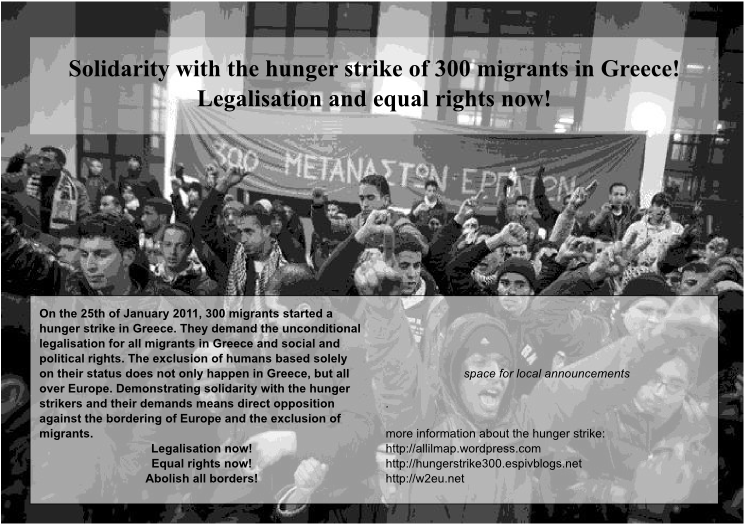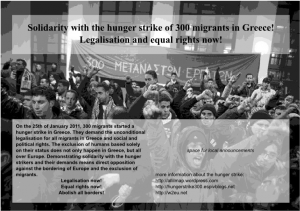The 25th of January is the day on which 300 migrants in Greece started a hunger strike. Their demand is a collective legalisation of all the people excluded from Greek society based on their status – be it asylum seekers, not recognised refugees, illegalised people, exploited migrant labourers. It is not the first hunger strike in Greece where human beings are forced to use such a drastic measure to fight for their rights.
It is not a particular Greek situation that the hunger strikers are denouncing. It is the effect of the European policy of bordering and exclusion. Accessing European territory is often a deadly venture. Refugees and migrants are not welcome in Europe, and fences, border guards and agencies, detention camps and deportation schemes have proliferated only to keep the unwanted at distance. But the dreams and the desires of the unwanted are stronger and enable many to scale the borders. The presence of a migrant population in Europe is a reality and they have come, and are coming to stay.
However, it is not only the fences and borders that are directed against these coming citizens of Europe. In a Europe that promised a homogeneous landscape of rights to its citizens in any country of the Union, non-European migrants often find themselves to be second-class citizens, or even outright excluded from political and social rights at large. This creates an exploitable labour force and a disadvantaged and disenfranchised part of the population. By creating such conditions, Europe profits from the products of migrant labour. In the Southern countries of the EU, the agricultural sector is heavily dependent on migrant labour, while all over Europe, migrants form the backbone of many service industries that are taken for granted.
But we are talking about human beings, with dreams and hopes, with plenty of reasons to go and to move. But as they arrive in Europe, they find themselves deprived of their rights as human beings, at the mercy of an asylum system, and at the fringes of society. It is exactly this social exclusion and disfranchisement, it is the lack of political and social rights that leads to the often unbearable conditions that are then denounced as the “migration problem”, used to justify repression, further exclusion, and deportation.
Migration is neither a crime nor a problem, but the European Union’s response is criminal and highly problematic. The 2008 European Pact on Immigration and Asylum has cemented this inhuman policy pursued for many years. While mentioning necessary advances in asylum and legal migration legislation, it has foremost served as a political initiative to harden the borders, further exclusion and deportation and is a declaration of war on migration. It lengthily talks about the solidarity between the EU member states, but it robbed especially the southern states of the only sensible answer to migration: it contains an explicit ban on collective legalisation.
The hunger strikers in Greece have decided to struggle for their rights, and rightly so. In a climate of increased repression and anti-migrant rhetoric, we have to act. Not only in Greece, all over Europe and indeed all over the world, we need to struggle for equal rights for everybody. We express our explicit solidarity with the hunger strikers in Greece, and we call to activists all over Europe to join the cause for a complete and unconditional legalisation.
We call for a week of action from the 7th to the 13th of February 2011 in solidarity with the hunger strikers!
Legalisation now!
Equal rights now!
For the abolition of borders!
January 2011 | Welcome to Europe Network

